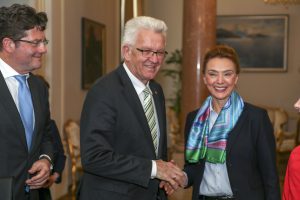The world is changing and sensible politics should be applied in shaping these shifts for the benefit of people. The Green Party in Baden-Württemberg does not shy away from such a task.
The Minister-President of Baden-Württemberg has recently paid a visit to Croatia, looking for new opportunities to strengthen the ties between one of the leading economic regions in Europe and the partners in the region. Croatia plays an important role in this endeavour, says Winfried Kretschmann Minister-President of Baden-Württemberg for Diplomacy&Commerce magazine.
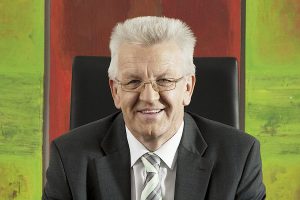
Winfried Kretschmann, you are the first ever Green Minister-President of any German state and personally a very popular politician. How do you explain such political outcome in times of rise of populism and emergence of new movements across Europe including those such as Alternative for Germany in your own courtyard?
We live in turbulent times, bombarded with fundamental upheavals such as globalization, the digital revolution and climate change. But also social modernization, Islamic terror, the crisis of the European unification or the changes brought about by the many refugees seeking protection in our country. Many people are intimidated by these changes. Fears of decline, fear of over-foreignization, overstraining and also anger are on the rise. Right-wing populists are using this conflict situation to their advantage. They imply they could put a stop to this change. However, that is nonsense. The world is changing – and sensible politics should rather be completely invested in shaping these shifts in such a way that the people also feel comfortable in a time of change. That is why we, the Green Party in Baden-Württemberg, see ourselves as a party with a clear orientation: firstly, we combine value orientation with pragmatism. Secondly, we take charge and assume responsibility and we do not shy away from great challenges. And thirdly, we create politics together with society – not against it. And we do not bend while doing so. But we do listen, we explain and we also compromise.
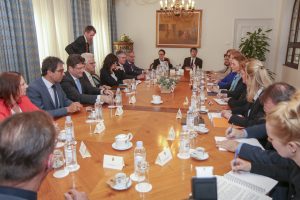
You were once quoted as saying that there is a potential for modern politicians to expect miracles such as unexpected changes and new goals in political life. What do you see as your primary goals in modern times? How do these changes shape your responses to the new global challenges?
In order to achieve real change, we need to act on three different levels: first of all, with regard to the stance we take when doing politics. A brave fundamental stance is needed to convey confidence against the backdrop of change. We should not in the first place perceive the aforementioned upheavals as a threat, but as a challenge that we can help shape. Secondly, we need politics which would really give people the capacity to cope with these big upheavals. It should enable successful integration, show the way to the digital world, and further strengthen internal security and Europe. And thirdly, there is the significance of the political style we employ. In other words, the way we resolve conflicts: we need to build bridges between us and those with differing mind-sets. We have to take their concerns and fears seriously, even if we do not share them. This does not mean that we simply give in to their fears, but our stance towards this must be clear. Furthermore, we politicians must speak with a comprehensible and clear voice, act with credibility and must not concede the emotional approach to politics to the populists.
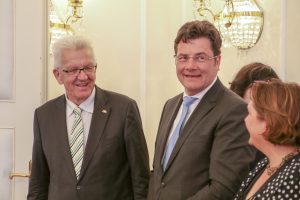
Baden-Württemberg as one of the most innovative and economically strong regions in the European Union which builds its approach on smart, sustainable and inclusive growth. What changes in the public policies such development implies?
The economy of Baden-Württemberg has the best prerequisites for mastering arising challenges. Our state is the home of inventive and hardworking people with an excellent education. We have highly innovative companies, an excellent scientific landscape and a successful network of research and industry. Naturally, politics plays a key role in the preservation and further development of these achievements: it must be innovative, digital and sustainable. Our economic policy is based on agreed upon values of a social and ecological market economy. Its central driving force is the triad of economy, ecology and fairness. We consider entrepreneurs and their employees our partners with whom we would like to shape the future of our industrial landscape. For instance, we only employ the instruments of regulatory law where they are really needed. Our economy has already proven that it can achieve profit with ecologically beneficial products. Baden-Württemberg is certainly too small to have a palpable impact on global challenges such as climate change. However, if our success encourages other companies on a global scale to take a similar path, then the impact will be tremendous! I consider this to be our mission as the government of one of the leading economic regions in Europe.
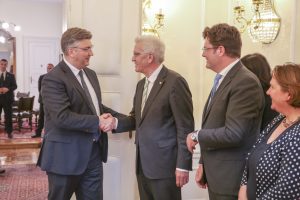
Croatia has strong relations with Baden Württemberg. How would you describe bilateral ties which shape todays cooperation between two states?
Croatia and Baden-Württemberg are linked through excellent political ties and a close cooperation. We maintain good economic relations and our foreign trade with Croatia continues to grow. In addition, we have been following Croatia´s role within the European Union since 2004 through our Mixed Government Committee. For instance, this includes initiatives in the scope of education, science and research. Today we have 35 partnerships between institutions of higher education from both countries and we cooperate on 60 projects of the EU Framework Programme for Research and Innovation “Horizon 2020”. This close cooperation is becoming more and more important in the course of a global competition for innovations!
How has the cooperation between Croatia and Baden-Württemberg, within the framework of the European Strategy for Danube Region (EUSDR) enhanced these relations?
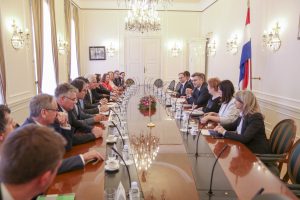
Within the framework of USDR, Baden-Württemberg and Croatia are jointly responsible for the area of competitiveness of enterprises. This topic obviously plays a key role for the development of the Danube Region with its large economic disparities. This responsibility enables us to work together continuously over the course of many years and to initiate joint projects. It also gives us the opportunity to set new priorities for the Danube Region as a whole and to bring forward important subjects – for example, by founding the working group “Digitalization” and strengthening partnerships in the realm of vocational education in the course of my delegation visit to South East Europe. However, what makes EUSDR special is also the fact that it represents the cooperation of 14 countries with completely different European know-how: this wide spectrum includes founding EU member states, recently joined countries such as Bulgaria, Romania and Croatia as well as countries which aim to follow the European path, but whose concrete EU perspective lies in the future. And of course, Croatia plays a key role in view of the Western Balkans – already because of similarities with the languages and structures of the other countries, but also on the grounds of the still very recent personal EU accession experience. Croatia must be aware of this responsibility for the stability of the area. It is a very important anchor of stability in this region!
Croatians are the 6th largest ethnic minority in Germany and have their largest minority in Baden-Wuerttemberg. How much is today diaspora a cultural bond between two countries?
There are over 100.000 Croats living here, who significantly contribute to our society and who build bridges between our two countries. It is through them that we discover the rich cultural traditions of Croatia and they promote an active exchange within our civil society. The ten local partnerships are also important. I consider this civic engagement a very significant pillar of our good relationship with Croatia. We also systematically promote cultural exchange: for instance, we offer culture professionals from Croatia internships at cultural institutions in Baden-Württemberg.
